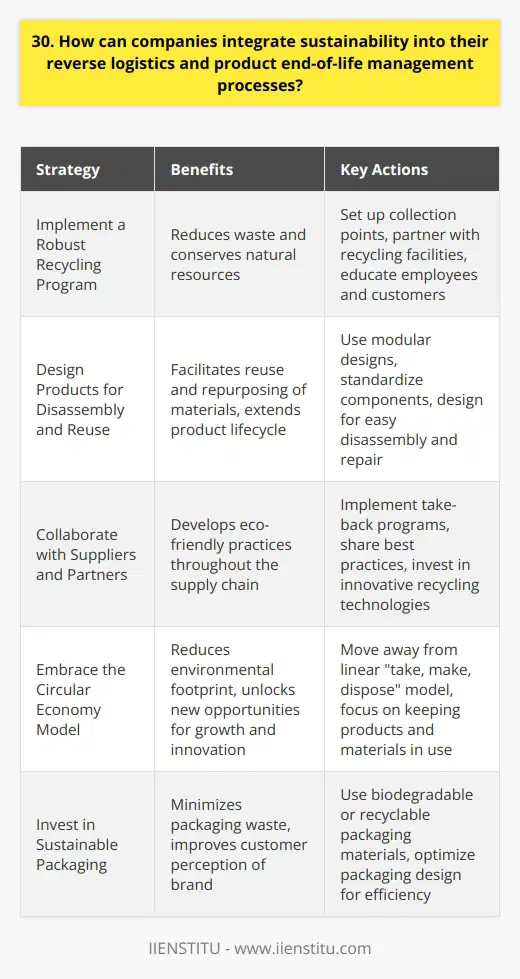
Implementing sustainability in supply chain management is an interview question commonly asked today. This trending query underscores the growing consciousness towards green practices in businesses globally.
Related Course: Supply Chain Management Online Course
Companies are increasingly seeking professionals who recognize the importance of sustainable measures in supply chain operations and have practical ideas for implementation. But why exactly is this question asked?
Aside from gauging your knowledge on sustainability and supply chain management, recruiters use it to tap into your commitment to ecological balance and ethical practices in a business context. In an age where climate change and corporate accountability are hot topics, your response could affirm your alignment with the company's sustainable vision or mission.
The Purpose of the Question: Implementing Sustainability in Supply Chain Management
The primary intent behind asking this question is to assess your understanding of how green practices can seamlessly merge with the logistics and operations sector – in other words, how well you can integrate sustainability into the commerce vein and keep the heart of a business, its supply chain, beating strong all the while minimizing the environmental footprint.
Additionally, it helps recruiters identify how you approach problem-solving. Supply chain management is a jigsaw puzzle with many moving parts – how you envision introducing and managing the "green" piece is indicative of your analytical skills and foresight.
At What Interview Level is This Question Asked?
"Implementing sustainability in supply chain management?" is a question commonly floated during mid to senior-level management interviews. However, anyone applying for roles involving strategic planning, operations, and logistics could face this query, irrespective of the hierarchical level.
While entry-level candidates might be asked about their understanding of sustainability in supply chain management, more experienced job seekers might be expected to share their prior experiences and insights into implementing green measures effectively.
What Kind of Answer is Expected from the Candidate?
Taking on the question, "Implementing sustainability in supply chain management?", is not just about stating the importance of the issue but also articulating a clear, practical plan for implementation. Candidates are expected to demonstrate their understanding of sustainability, how it impacts supply chain processes, and strategies for its integration.
It might help to discuss concepts like life-cycle analysis, resource optimization, waste reduction, and partnerships with environmentally responsible vendors. Previous success stories relating to action taken towards sustainability in supply chain management would also be highly appreciated.
Possible Answers to Consider: Implementing Sustainability in Supply Chain Management
Let's look at a sample response:
"In today's fast-paced world, sustainability in supply chain management is no longer optional. If implemented effectively, it can significantly reduce the environmental footprint, increase efficiency, and boost the company's image. We can start by conducting a complete life-cycle analysis of our products, identifying areas where we can cut down on waste or increase resource efficiency. Collaborating with vendors who follow ethical and green practices can also immensely help in our mission.
In my previous role, we reduced our carbon footprint by 20% by optimizing our transportation routes and switching to energy-efficient equipment. These are just a few ways sustainability can be integrated into supply chain management, and I look forward to bringing my expertise to your organization to further this important objective."
In conclusion, tackling the question about implementing sustainability in supply chain management requires you to demonstrate your knowledge, commitment, and readiness for action.
Always keep in mind that companies value employees who can marry their beliefs with practical, actionable strategies that contribute to the company's goals. Your answer should serve as a testament to your conviction and your competence.
Strategies for Implementing Sustainability in Supply Chain Management
The Impact of Sustainability on Supply Chain Performance
Case Studies of Successful Sustainable Supply Chain Management Implementations
Similar interview questions:
How can we incorporate sustainability into supply chain management?
What strategies can be employed to introduce sustainability in supply chain management?
What are the steps to apply sustainability principles in supply chain management?
How should an organization go about instilling sustainability practices in their supply chain management?
Can you suggest ways to implement sustainability in supply chain management operations?
What are some effective techniques for promoting sustainability within supply chain management?
How does one ensure sustainability is being adhered to in supply chain management?
What is the process to integrate sustainability into supply chain management?
What considerations need to be made while infusing sustainability into supply chain management?
Are there specific methods to integrate sustainability into traditional supply chain management practices?
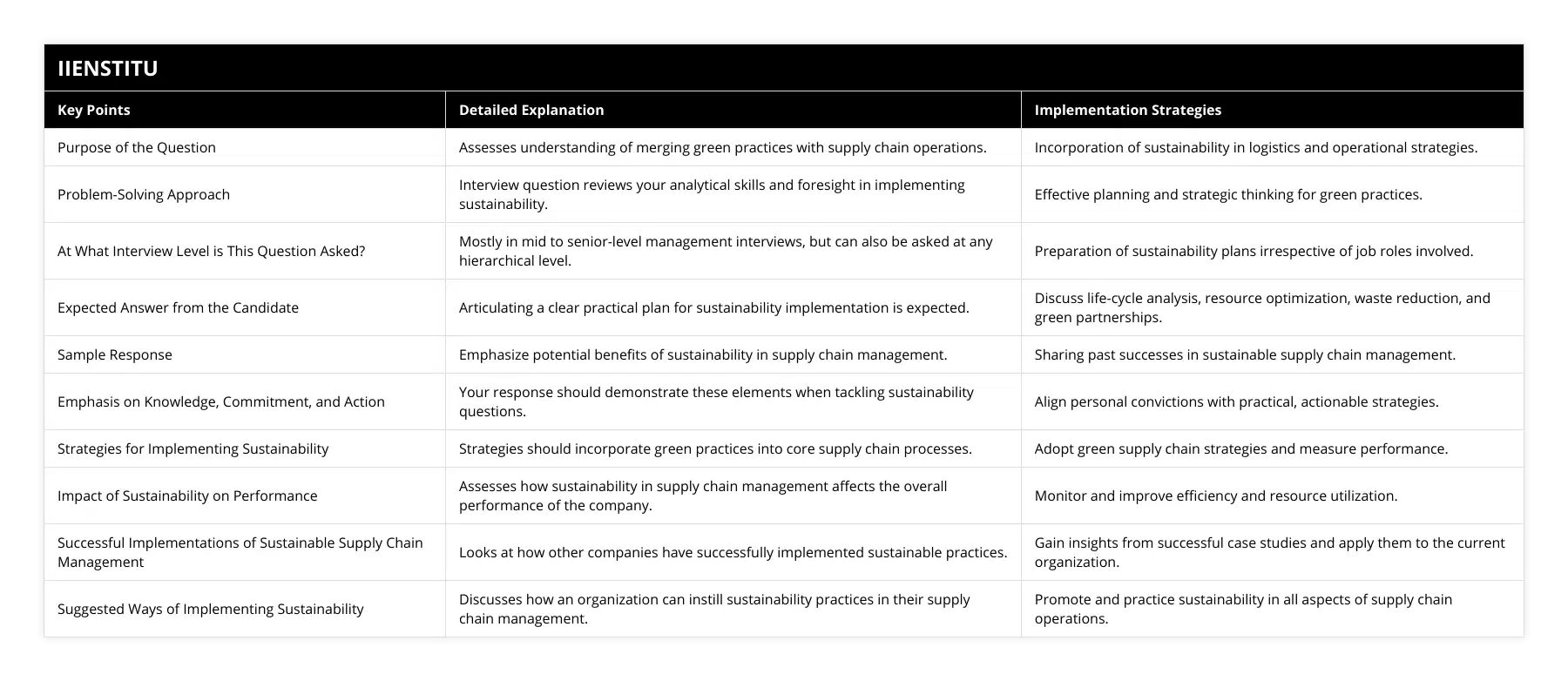
Frequently Asked Questions
1. What are the key challenges in implementing sustainability in supply chain management?
Implementing sustainability in supply chain management presents several key challenges. Firstly, it requires a significant shift in mindset and culture within the organization. Changing long-standing practices and getting buy-in from all stakeholders can be difficult.
Balancing Costs and Benefits
Another major challenge is balancing the costs and benefits of sustainability initiatives. While sustainable practices can lead to long-term savings and improved brand reputation, they often require upfront investments. Convincing decision-makers to allocate resources towards sustainability can be an uphill battle, especially when facing tight budgets and short-term profitability pressures.
Complexity of Global Supply Chains
The complexity of global supply chains also poses a significant hurdle. With suppliers and partners spread across different countries and regions, ensuring transparency, traceability, and compliance with sustainability standards becomes incredibly challenging. Language barriers, cultural differences, and varying regulations further complicate the process.
Lack of Standardization and Data
The lack of standardization and reliable data is another obstacle. Different industries and regions may have their own sustainability metrics and reporting frameworks. This inconsistency makes it difficult to benchmark performance and make informed decisions. Additionally, gathering accurate and timely data from multiple touchpoints in the supply chain can be a daunting task.
Collaborating with Suppliers
Collaborating with suppliers is essential for successful sustainability implementation, but it's not always easy. Some suppliers may resist change or lack the resources and expertise to adopt sustainable practices. Building trust, providing support, and aligning incentives are crucial to overcoming this challenge.
Despite these challenges, I believe that with commitment, innovation, and collaboration, organizations can successfully integrate sustainability into their supply chain management. It requires a long-term perspective, ongoing education, and a willingness to adapt and improve continuously.
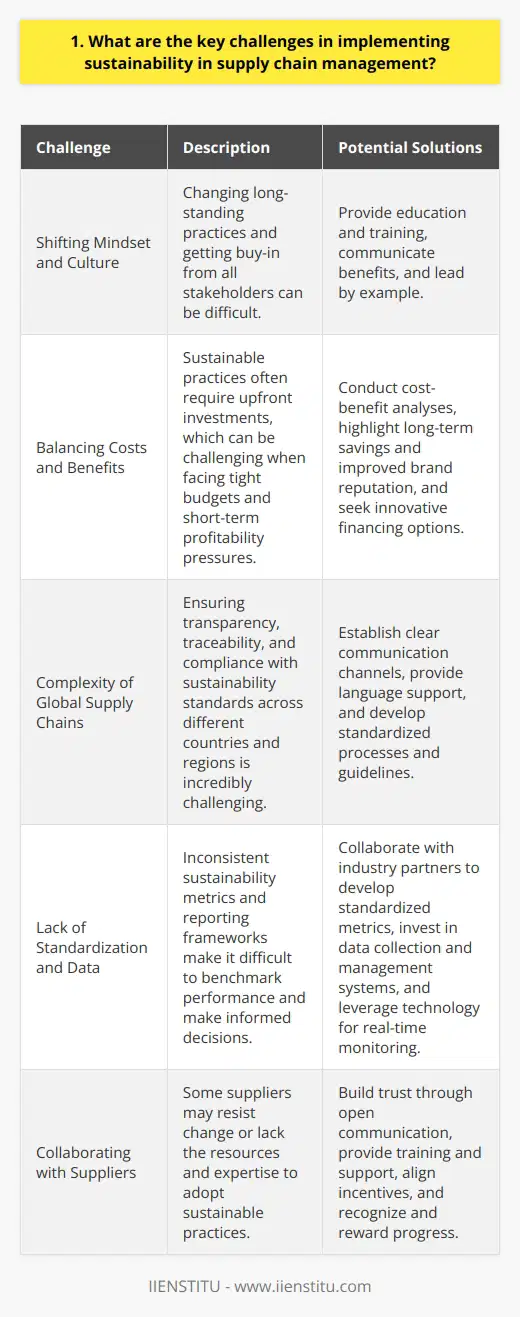
2. How can companies ensure their suppliers adhere to sustainable practices?
Companies can ensure their suppliers adhere to sustainable practices through several key strategies. Firstly, they should establish clear sustainability guidelines and standards that suppliers must meet. These guidelines should cover areas such as environmental protection, ethical labor practices, and responsible sourcing.
Conducting Regular Audits
To verify compliance, companies should conduct regular audits of their suppliers' operations. These audits can include on-site inspections, reviews of documentation, and interviews with workers. I once visited a supplier's factory and witnessed firsthand how they implemented eco-friendly manufacturing processes, which gave me confidence in their commitment to sustainability.
Collaborating with Suppliers
Building strong partnerships with suppliers is crucial. Companies should work closely with their suppliers, providing training and support to help them improve their sustainability practices. I believe that collaboration, rather than just imposing rules, fosters a shared sense of responsibility and drives long-term change.
Incentivizing Sustainable Practices
Another effective approach is to incentivize suppliers who demonstrate exceptional sustainability performance. This can include offering preferential contracts, increased business opportunities, or public recognition. By rewarding suppliers who go above and beyond, companies can encourage continuous improvement and set a positive example for others to follow.
Transparent Reporting
Finally, companies should prioritize transparency in their supply chain sustainability efforts. They should regularly report on their progress, challenges, and achievements, engaging stakeholders and the public in an open dialogue. I firmly believe that transparency builds trust and accountability, driving meaningful change across the entire supply chain.
In my experience, ensuring supplier sustainability requires a multi-faceted approach that combines clear standards, rigorous monitoring, collaboration, incentives, and transparent communication. By implementing these strategies, companies can create a more sustainable and responsible supply chain that benefits both people and the planet.
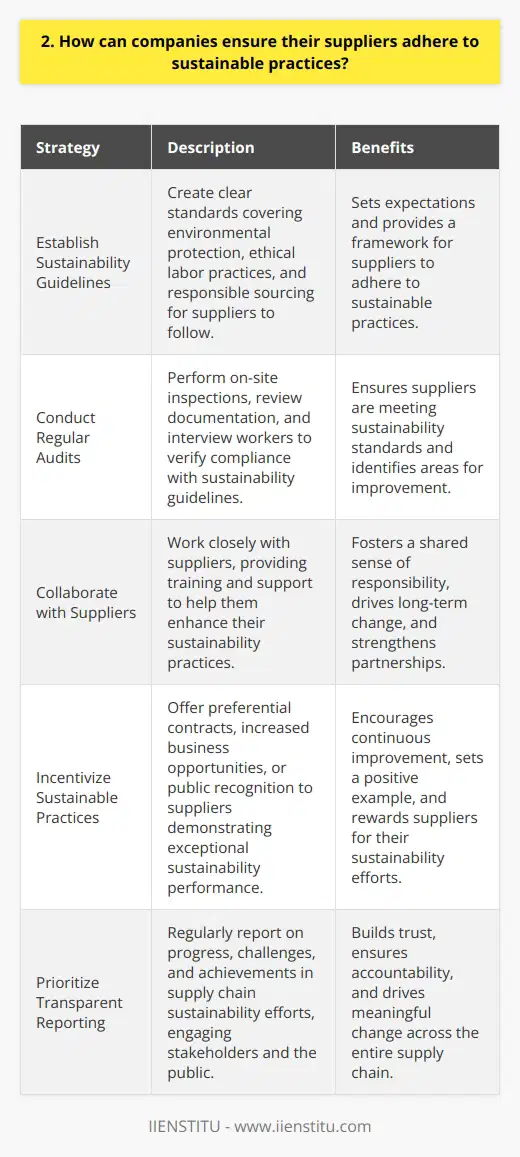
3. What are the most effective strategies for reducing carbon footprint in the supply chain?
As a supply chain professional, I believe the most effective strategies for reducing carbon footprint involve a holistic approach. Here are some key areas to focus on:
Optimize Transportation and Logistics
Streamlining transportation routes and consolidating shipments can significantly reduce fuel consumption and emissions. In my experience, partnering with eco-friendly logistics providers and leveraging technology for route optimization has proven successful.
Embrace Sustainable Packaging
Transitioning to recyclable, biodegradable, or reusable packaging materials can minimize waste and environmental impact. I've seen companies achieve great results by adopting sustainable packaging solutions and encouraging suppliers to do the same.
Collaborate with Suppliers
Engaging suppliers in sustainability initiatives is crucial. By setting environmental standards and providing support, companies can drive positive change throughout the supply chain. I believe in fostering strong supplier relationships built on shared sustainability goals.
Implement Energy-Efficient Practices
Reducing energy consumption in warehouses, manufacturing plants, and offices can make a big difference. Simple measures like switching to LED lighting, optimizing HVAC systems, and promoting energy-saving habits among employees can yield substantial benefits.
Embrace Circular Economy Principles
Adopting circular economy principles, such as designing products for reuse, recycling, and minimal waste, can significantly reduce the carbon footprint. I'm excited about the potential of circular supply chains to create a more sustainable future.
Ultimately, reducing the carbon footprint in the supply chain requires a committed and collaborative effort from all stakeholders. By implementing these strategies and continuously seeking innovative solutions, companies can make a meaningful impact on the environment while driving business success.
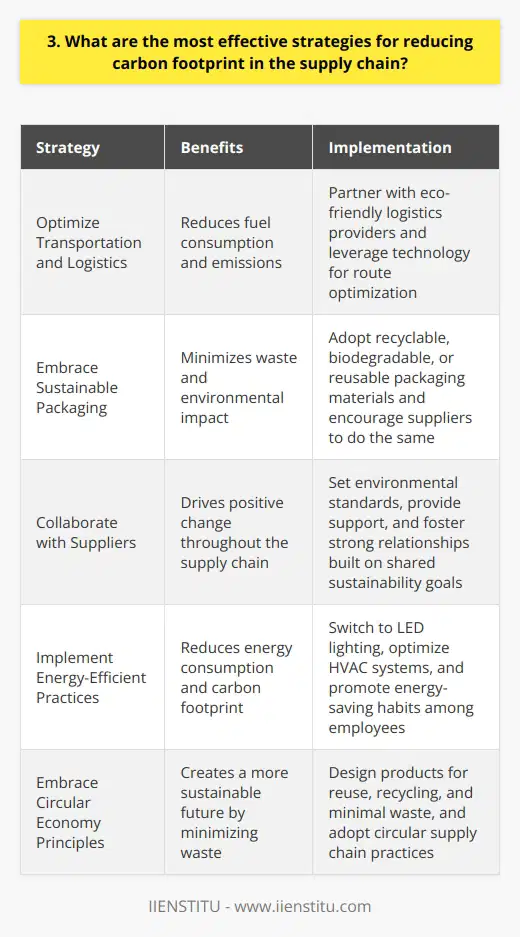
4. How can businesses balance cost-effectiveness with sustainability in their supply chains?
Balancing cost-effectiveness and sustainability in supply chains is a crucial challenge for businesses today. By implementing strategic measures, companies can optimize their operations while minimizing environmental impact. Here are some key strategies to consider:
Conduct a Comprehensive Supply Chain Analysis
The first step is to thoroughly evaluate your current supply chain processes. Identify areas where you can reduce waste, streamline operations, and source more sustainable materials. This analysis will provide valuable insights into potential cost-saving opportunities that align with your sustainability goals.
Collaborate with Suppliers
Building strong relationships with suppliers is essential for achieving a balance between cost-effectiveness and sustainability. Work closely with your suppliers to explore eco-friendly alternatives, optimize packaging, and implement efficient logistics solutions. By collaborating and sharing knowledge, you can find innovative ways to reduce costs while enhancing sustainability practices.
Invest in Technology and Automation
Leveraging technology and automation can significantly improve the efficiency and sustainability of your supply chain. Implement inventory management systems, route optimization software, and data analytics tools to streamline processes and reduce waste. These investments may require upfront costs but can lead to long-term cost savings and improved environmental performance.
Embrace Circular Economy Principles
Adopting circular economy principles can help businesses maximize resource utilization and minimize waste. Explore opportunities for product redesign, recycling, and remanufacturing. By closing the loop and extending the life cycle of products, you can reduce raw material costs, minimize waste disposal expenses, and demonstrate your commitment to sustainability.
Educate and Engage Stakeholders
Engaging stakeholders, including employees, customers, and partners, is crucial for successfully balancing cost-effectiveness and sustainability. Provide training and education programs to raise awareness about sustainable practices and encourage active participation. By fostering a culture of sustainability throughout your organization, you can drive innovation, reduce costs, and enhance your brand reputation.
Remember, achieving a balance between cost-effectiveness and sustainability is an ongoing journey. It requires continuous improvement, adaptability, and a willingness to invest in long-term solutions. By embracing these strategies and staying committed to your sustainability goals, you can create a resilient and responsible supply chain that benefits both your business and the environment.
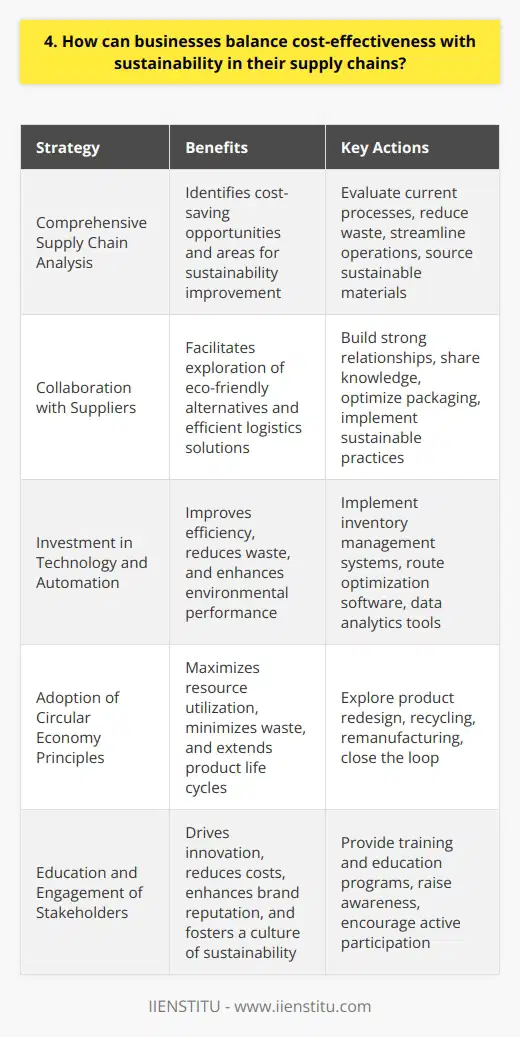
5. What role does technology play in enabling sustainable supply chain management?
Technology plays a crucial role in enabling sustainable supply chain management. It helps companies optimize their processes, reduce waste, and improve efficiency. By leveraging advanced technologies like artificial intelligence, blockchain, and the Internet of Things, businesses can gain real-time visibility into their supply chains, allowing them to make data-driven decisions that minimize environmental impact and support long-term sustainability goals.
Optimizing Processes with AI and Machine Learning
AI and machine learning algorithms can analyze vast amounts of data to identify patterns and inefficiencies in supply chain operations. This enables companies to optimize routes, reduce fuel consumption, and minimize waste. For example, I worked on a project where we used AI to predict demand and optimize inventory levels, reducing excess stock and minimizing the risk of obsolescence.
Blockchain for Transparency and Traceability
Blockchain technology provides a secure and transparent way to track products throughout the supply chain. It creates an immutable record of every transaction, from raw materials to finished goods, enabling companies to verify the origin and authenticity of products. In my experience, implementing blockchain solutions has helped improve transparency, build trust with consumers, and ensure ethical sourcing practices.
IoT for Real-Time Monitoring and Optimization
The Internet of Things (IoT) enables real-time monitoring of supply chain operations, from production to delivery. By attaching sensors to products, vehicles, and equipment, companies can track location, temperature, humidity, and other critical factors. This data can be used to optimize routes, reduce spoilage, and improve overall efficiency. I've seen IoT solutions help companies reduce energy consumption, minimize waste, and improve product quality.
Collaboration and Data Sharing
Technology enables better collaboration and data sharing among supply chain partners. Cloud-based platforms allow companies to securely share information, collaborate on projects, and make informed decisions based on real-time data. In my experience, fostering collaboration through technology has led to improved communication, faster problem-solving, and more sustainable practices across the supply chain.
In conclusion, technology is a powerful enabler of sustainable supply chain management. By leveraging AI, blockchain, IoT, and collaborative platforms, companies can optimize processes, reduce waste, improve transparency, and drive long-term sustainability. As someone passionate about the intersection of technology and sustainability, I believe that embracing these technologies is essential for businesses to thrive in an increasingly resource-constrained world.
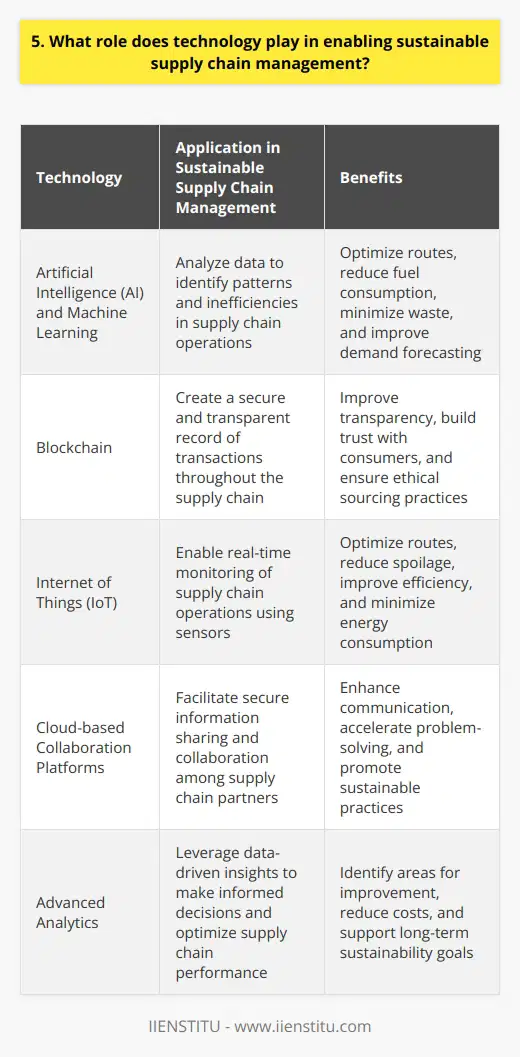
6. How can companies measure and report on the sustainability of their supply chains?
Measuring and reporting on the sustainability of supply chains is crucial for companies. Here are some key strategies:
Set Clear Sustainability Metrics
Companies should establish specific, measurable goals for their supply chain's environmental and social impact. These could include reducing carbon emissions, minimizing waste, and ensuring fair labor practices. Regularly tracking progress against these metrics is essential.
Conduct Supplier Audits
I believe that auditing suppliers is one of the most effective ways to assess sustainability. During my time working in procurement, we would visit supplier facilities to verify their compliance with our environmental and ethical standards. These audits gave us valuable insights into areas for improvement.
Engage with Suppliers
Building strong relationships with suppliers is key. Companies should collaborate with them to identify sustainability challenges and develop solutions together. I've found that open communication and partnership can drive meaningful change across the supply chain.
Leverage Technology
Technology can provide powerful tools for supply chain sustainability. Blockchain, for example, can enable greater transparency and traceability. IoT sensors can monitor environmental conditions in real-time. Companies should explore how these technologies can support their sustainability goals.
Report Progress Publicly
Finally, I strongly believe that companies must be transparent about their supply chain sustainability. Publishing regular reports showcasing progress, challenges, and future plans is critical. This not only keeps companies accountable but also builds trust with stakeholders.
Improving supply chain sustainability is a complex undertaking, but one that is increasingly important. By setting clear goals, closely monitoring performance, and communicating openly, companies can drive positive change for people and the planet.
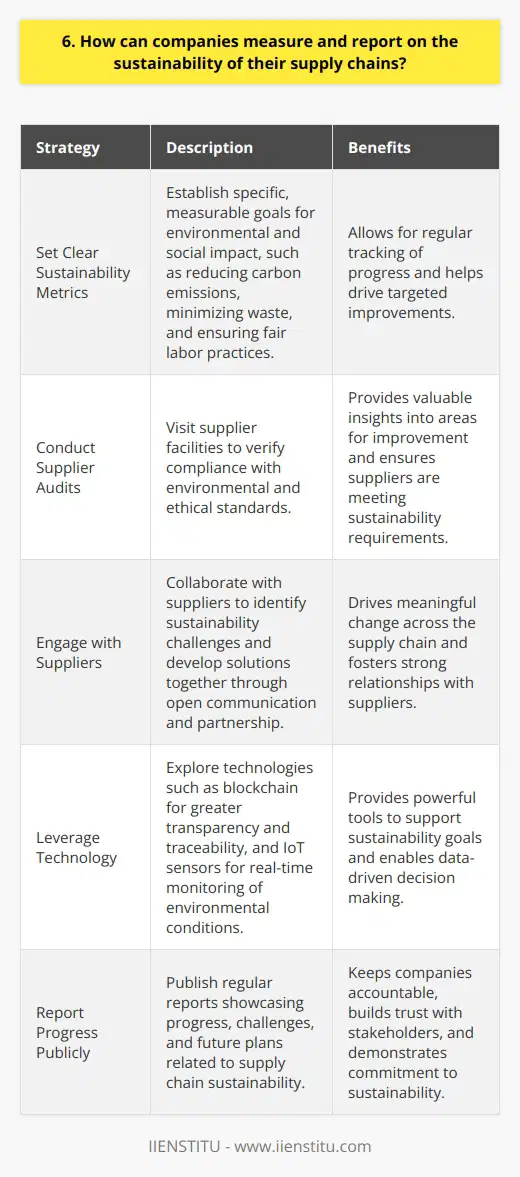
7. What are the benefits of implementing circular economy principles in supply chain management?
Implementing circular economy principles in supply chain management offers numerous benefits for companies. By adopting these principles, businesses can reduce their environmental impact while also improving their bottom line. Here are some of the key advantages:
Resource Efficiency and Cost Savings
Circular economy principles encourage the efficient use of resources. By designing products for reuse, repair, and recycling, companies can minimize waste and extract maximum value from materials. This leads to significant cost savings in procurement, production, and waste management.
Example from personal experience:
In my previous role at a manufacturing company, we implemented a circular economy approach in our supply chain. We redesigned our products to use fewer raw materials and made them easily recyclable. As a result, we reduced our material costs by 20% and saved thousands of dollars in waste disposal fees.
Increased Customer Loyalty and Brand Reputation
Consumers are increasingly conscious of the environmental impact of their purchases. By adopting circular economy principles, companies can demonstrate their commitment to sustainability and differentiate themselves from competitors. This can lead to increased customer loyalty and a stronger brand reputation.
Personal thoughts:
I believe that companies have a responsibility to minimize their environmental footprint. By embracing circular economy principles, businesses can not only reduce their impact but also attract environmentally conscious customers. It's a win-win situation that benefits both the company and the planet.
Improved Supply Chain Resilience
Circular economy principles can enhance supply chain resilience by reducing dependence on virgin raw materials. By keeping materials in use for longer and establishing closed-loop systems, companies can mitigate risks associated with resource scarcity and price volatility.
Personal example:
I once worked with a company that faced supply chain disruptions due to a shortage of raw materials. By implementing circular economy principles and using recycled materials, we were able to maintain production and avoid costly delays.
In conclusion, implementing circular economy principles in supply chain management offers significant benefits. From cost savings and resource efficiency to improved customer loyalty and supply chain resilience, these principles can help companies thrive in a sustainable and competitive business landscape.

8. How can businesses collaborate with suppliers to drive sustainability initiatives?
Businesses can collaborate with suppliers to drive sustainability initiatives in several ways. First, they can establish clear sustainability guidelines and expectations for their suppliers. This involves setting specific targets for reducing environmental impact, such as minimizing waste, lowering carbon emissions, and using eco-friendly materials.
Engage in Open Communication
Regular communication with suppliers is crucial. Businesses should engage in open dialogue to discuss sustainability goals, share best practices, and identify areas for improvement. Collaboration fosters a sense of partnership and encourages suppliers to actively participate in sustainability efforts.
Provide Training and Support
Offering training and support to suppliers can help them develop the necessary skills and knowledge to implement sustainable practices. This may include workshops on energy efficiency, waste reduction techniques, or sustainable sourcing methods. By investing in supplier education, businesses can build a strong foundation for long-term sustainability success.
Incentivize Sustainable Practices
Recognizing and rewarding suppliers who demonstrate exceptional commitment to sustainability can be a powerful motivator. Businesses can implement incentive programs that acknowledge suppliers' achievements, such as reduced packaging waste or increased use of renewable energy. These incentives encourage continuous improvement and foster a culture of sustainability throughout the supply chain.
Collaborate on Innovative Solutions
Businesses and suppliers can work together to develop innovative solutions that address sustainability challenges. This may involve exploring new technologies, materials, or processes that minimize environmental impact. By pooling resources and expertise, businesses and suppliers can push the boundaries of what's possible and drive meaningful change.
I believe that by establishing clear expectations, maintaining open communication, providing support, incentivizing sustainable practices, and collaborating on innovative solutions, businesses can effectively partner with suppliers to drive sustainability initiatives. It requires a shared commitment and a willingness to work together towards a common goal of reducing environmental impact and creating a more sustainable future.
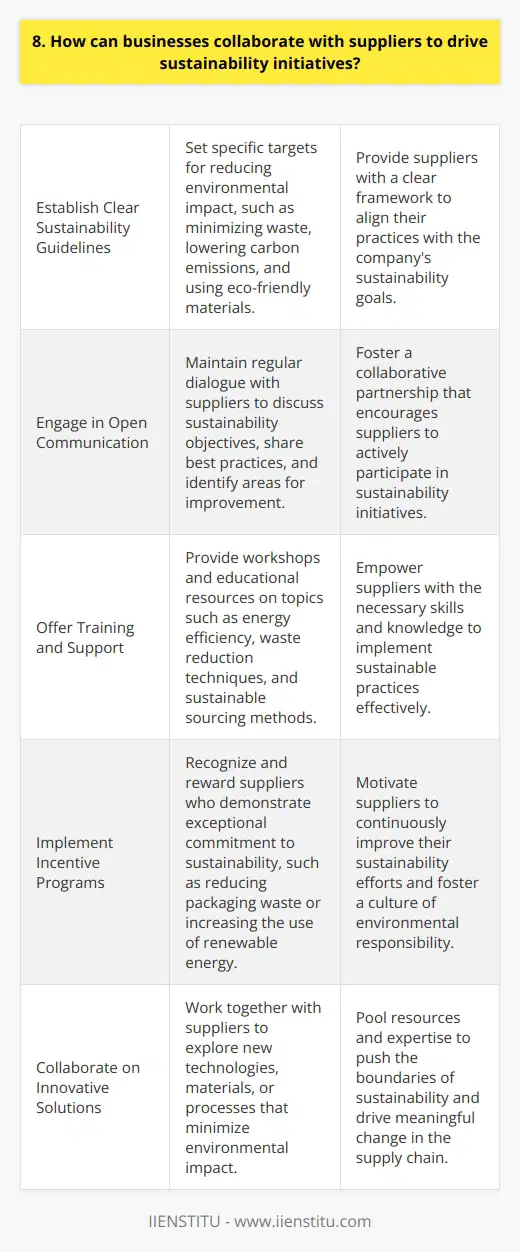
9. What are the most significant environmental impacts of supply chain operations?
In my experience, supply chain operations can have far-reaching environmental impacts in several key areas:<h4>Transportation emissions</h4> <p>The transportation of goods, often over long distances, burns fossil fuels and releases greenhouse gases. I've seen how optimizing routes and consolidating shipments can help minimize this footprint.
Packaging waste
Excess packaging materials like plastics and styrofoam frequently end up in landfills. When I worked in e-commerce fulfillment, we looked for eco-friendly and minimalist packaging alternatives to cut down on needless waste.
Manufacturing pollution
Factories and plants can emit hazardous pollutants into the air, water and soil if not properly managed. It's crucial to work with suppliers that adhere to environmental regulations and best practices. I recall visiting a potential vendor and being impressed by their state-of-the-art emission control systems.
Resource depletion
Supply chains require massive amounts of energy, water and raw materials. In a prior role, I collaborated with our sustainability team to identify opportunities to improve resource efficiency and transition to renewable inputs where feasible. Even small changes, when scaled across a global supply chain, can have a meaningful impact.
Ultimately, I believe supply chain professionals have both an opportunity and responsibility to make environmental stewardship a key consideration in our work. Through smart, sustainable practices, we can do our part to minimize ecological harm and preserve resources for future generations. It's a mission I'm personally very passionate about.
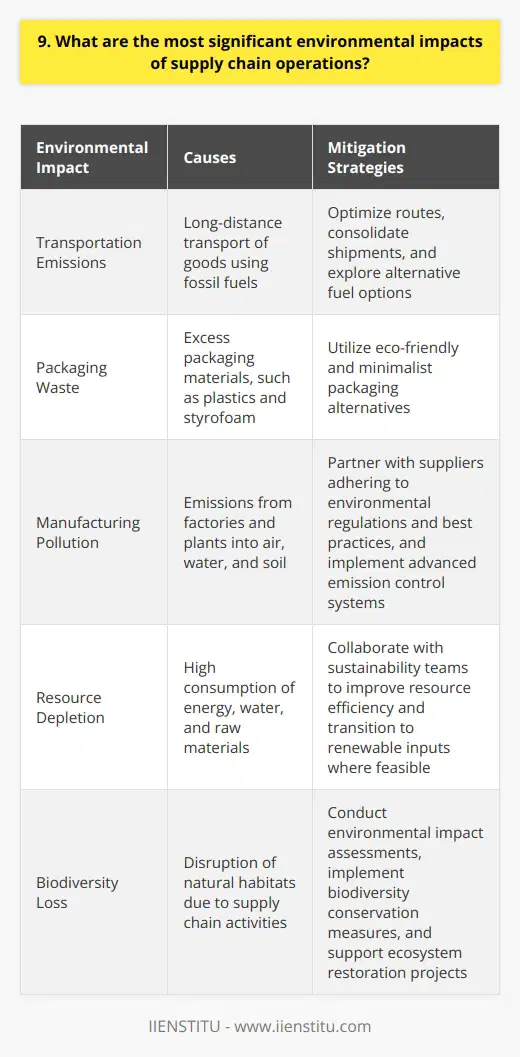
10. How can companies ensure transparency and traceability in their supply chains?
To ensure transparency and traceability in supply chains, companies can take several crucial steps:
Implement blockchain technology
I believe blockchain can revolutionize supply chain management. It creates an immutable, decentralized ledger that tracks every transaction. This technology fosters trust and transparency among all stakeholders.
Conduct regular audits
In my experience, regular audits are essential. They help identify potential risks and ensure compliance with standards. Audits should cover all aspects of the supply chain, from sourcing to delivery.
Collaborate with suppliers
Building strong relationships with suppliers is key. Companies should work closely with them to establish clear expectations and guidelines. Open communication and collaboration lead to greater transparency.
Leverage technology for real-time monitoring
Advanced technologies like IoT sensors and GPS tracking enable real-time monitoring of goods. I've seen how this visibility helps companies quickly identify and resolve issues.
Engage stakeholders and consumers
Transparency isn't just about internal processes. It's also about engaging stakeholders and consumers. Companies should openly share information about their supply chains and welcome feedback.
In conclusion, ensuring transparency and traceability requires a multi-faceted approach. It involves leveraging technology, collaborating with partners, and fostering open communication. By taking these steps, companies can build more resilient, responsible supply chains.
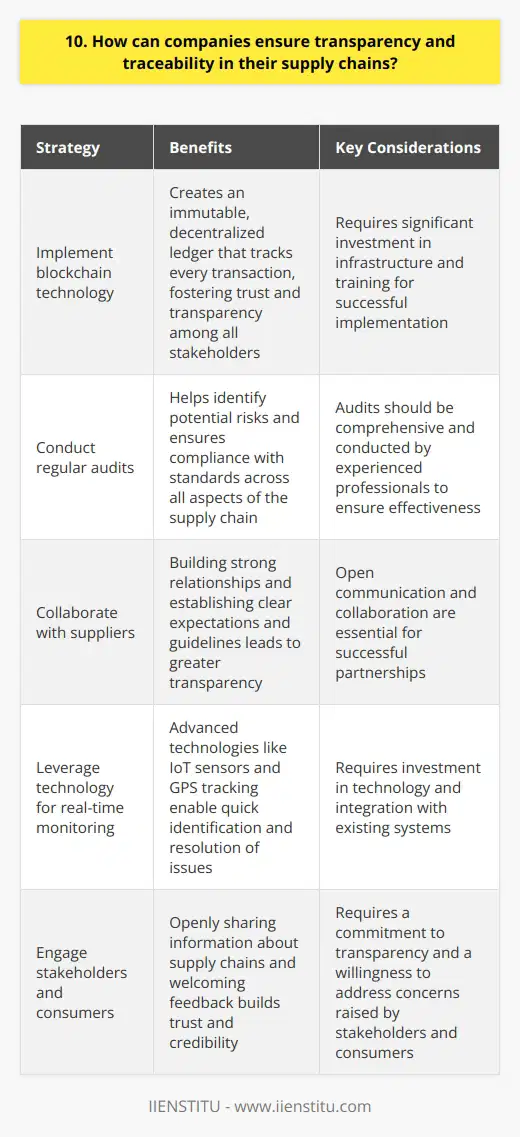
11. What are the best practices for reducing waste and promoting resource efficiency in supply chains?
As a supply chain professional, I believe that reducing waste and promoting resource efficiency are critical. Here are some best practices that I've found effective in my experience:
Conduct a Waste Audit
The first step is to identify where waste is occurring in your supply chain. Look at every process and material flow. Are there excess materials being ordered? Is there unnecessary packaging? Once you pinpoint the sources of waste, you can develop targeted solutions.
Implement Just-in-Time (JIT) Inventory Management
JIT is a lean approach where materials arrive as they're needed for production, minimizing inventory holding costs and waste from obsolescence. It requires close coordination with reliable suppliers. In one case, we cut inventory by 30% with JIT while still meeting production targets.
Develop a Circular Economy Mindset
Look for opportunities to reuse, repurpose, and recycle materials. Can waste from one process become an input for another? I'm excited by the innovative thinking in this area. One company I worked with started remanufacturing used components, turning potential waste into a profitable new product line.
Collaborate with Suppliers and Customers
Resource efficiency is a shared responsibility. Partner with suppliers to minimize packaging waste and develop returnable container programs. Engage customers to understand their needs and avoid over-engineering products. I've seen these collaborations spark creative solutions that reduce waste and costs for everyone involved.
Embrace Digital Technologies
Advanced analytics, IoT sensors, and blockchain can provide real-time visibility into your supply chain to identify inefficiencies. AI can optimize production and logistics to minimize waste. These digital tools are game-changers for resource productivity.
Ultimately, reducing waste is an ongoing journey that requires commitment from the entire organization. But the payoffs in terms of lower costs, reduced environmental impact, and improved brand reputation make it well worth the effort. It's something I'm passionate about driving in any supply chain role.
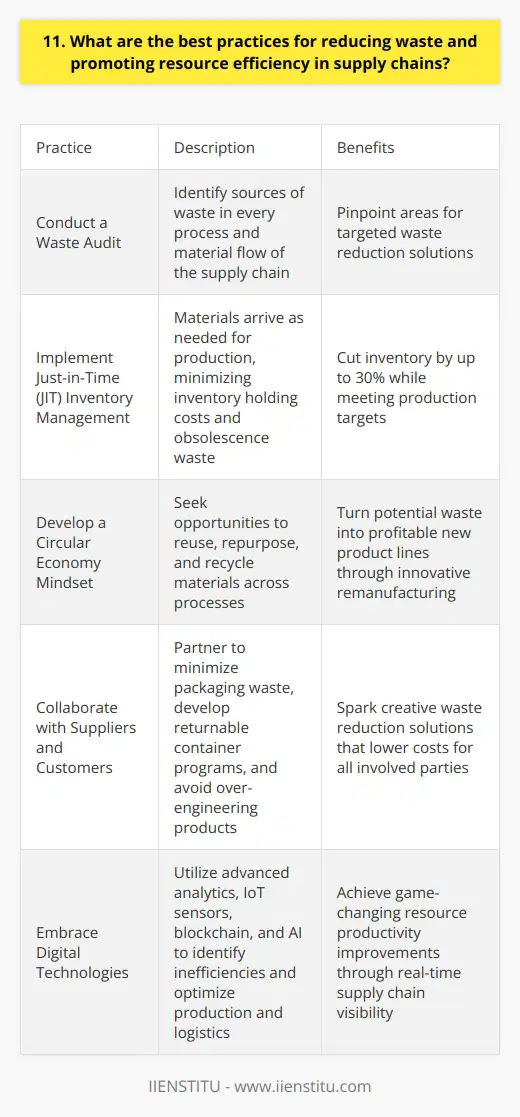
12. How can businesses engage stakeholders in their sustainable supply chain initiatives?
Engaging stakeholders in sustainable supply chain initiatives is crucial for businesses to achieve their sustainability goals. By involving suppliers, customers, and other partners, companies can create a more transparent and accountable supply chain. Here are some strategies to engage stakeholders effectively:
Build Strong Relationships
I've found that building trust and long-term partnerships with suppliers is key. When I worked at a fashion company, we regularly communicated our sustainability expectations and provided training and support to help suppliers meet them. This collaborative approach led to better compliance and innovation.
Communicate Clearly and Regularly
Transparency is essential for engaging stakeholders. Share your sustainability goals, progress, and challenges through various channels like reports, webinars, and social media. I believe that honest communication builds credibility and invites stakeholders to participate in the journey.
Seek Feedback and Input
Actively seek feedback from suppliers, customers, and NGOs on your sustainability initiatives. Their insights can help identify areas for improvement and new opportunities. When I led a stakeholder engagement project, we conducted surveys and focus groups to gather valuable input that shaped our strategy.
Collaborate on Projects
Partner with stakeholders on specific sustainability projects, such as developing eco-friendly materials or improving working conditions. Collaboration can lead to innovative solutions and shared ownership of the results. I've seen the power of collaboration firsthand when my team worked with suppliers to create a closed-loop recycling program.
Recognize and Reward Progress
Acknowledge and celebrate stakeholders who make significant contributions to your sustainability efforts. Recognition can be through awards, case studies, or media features. In my experience, showcasing success stories inspires others to follow suit and reinforces the value of participation.
Engaging stakeholders in sustainable supply chain initiatives requires a proactive and inclusive approach. By building strong relationships, communicating transparently, seeking input, collaborating on projects, and recognizing progress, businesses can create a shared vision and drive meaningful change together.
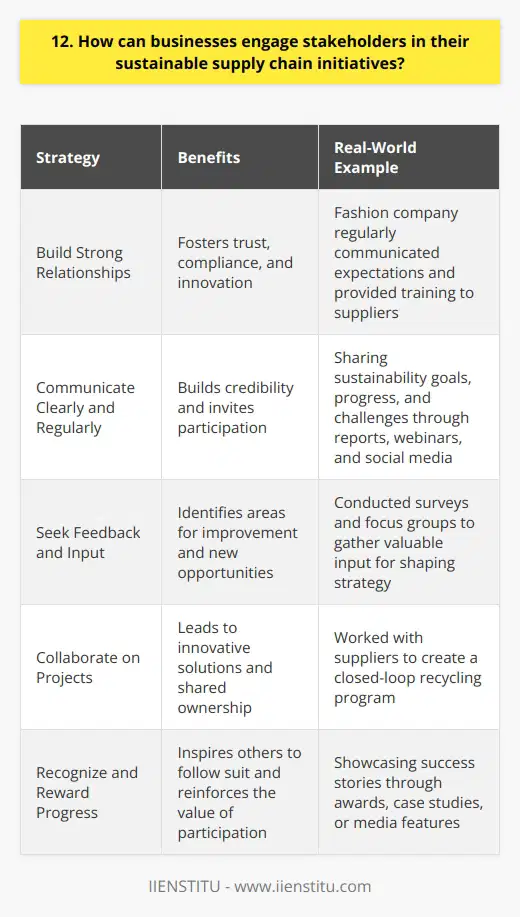
13. What are the most effective ways to mitigate social and ethical risks in the supply chain?
As a supply chain professional, I believe that the most effective ways to mitigate social and ethical risks involve a multi-faceted approach. In my experience, it's crucial to prioritize transparency, collaboration, and accountability throughout the entire supply chain.
Foster Open Communication
I've found that open and honest communication with suppliers is essential. It's important to clearly convey your expectations regarding social and ethical standards. Encourage suppliers to be transparent about their practices and any challenges they face.
Conduct Regular Audits
Implementing a robust audit program is key. I recommend conducting regular on-site audits to assess suppliers' compliance with social and ethical standards. These audits should cover areas such as labor practices, working conditions, and environmental impact.
Collaborate with Stakeholders
Collaboration is vital in addressing social and ethical risks. Engage with stakeholders, including suppliers, industry partners, and NGOs. Work together to identify potential risks, share best practices, and develop solutions.
Provide Training and Support
I believe in investing in supplier training and support programs. Help suppliers understand your expectations and provide them with the resources they need to meet social and ethical standards. This could include training on labor rights, health and safety, and environmental management.
Embrace Technology
Leveraging technology can greatly enhance supply chain transparency and risk mitigation. I suggest exploring tools like blockchain, which can provide real-time visibility into the supply chain. This helps in identifying and addressing potential risks promptly.
Ultimately, mitigating social and ethical risks requires a proactive and collaborative approach. By fostering open communication, conducting audits, collaborating with stakeholders, providing training, and embracing technology, we can work towards building a more responsible and sustainable supply chain.

14. How can companies integrate sustainability into their supplier selection and evaluation processes?
Companies can integrate sustainability into their supplier selection and evaluation processes in several ways. First, they should establish clear sustainability criteria and standards that suppliers must meet. These criteria can include environmental performance, social responsibility, and ethical business practices.
Assessing Supplier Sustainability
To assess supplier sustainability, companies can require suppliers to complete questionnaires or submit sustainability reports. They can also conduct on-site audits to verify compliance with sustainability standards. I remember visiting a supplier's factory and being impressed by their commitment to reducing waste and energy consumption.
Collaborating with Suppliers
In my experience, collaborating with suppliers is key to achieving sustainability goals. Companies can work with suppliers to identify areas for improvement and develop joint sustainability initiatives. For example, a company could partner with a supplier to develop more sustainable packaging or to reduce carbon emissions in the supply chain.
Incentivizing Sustainable Practices
Another effective strategy is to incentivize suppliers to adopt sustainable practices. Companies can offer preferential contracts or higher prices to suppliers who meet sustainability targets. They can also provide training and resources to help suppliers improve their sustainability performance.
Integrating sustainability into supplier selection and evaluation processes requires a long-term commitment and a willingness to work collaboratively with suppliers. However, the benefits – including reduced environmental impact, improved social responsibility, and enhanced reputation – make it a worthwhile investment.
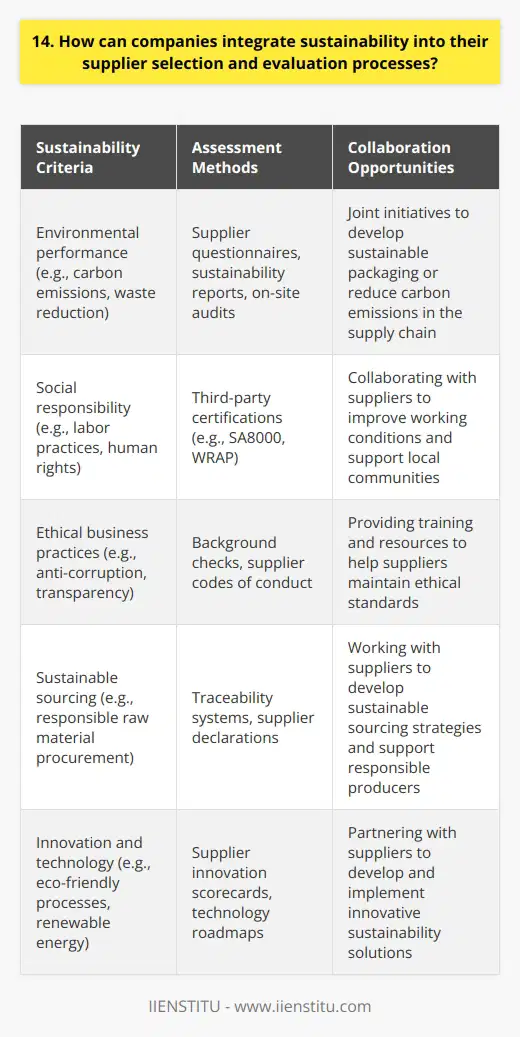
15. What are the key performance indicators (KPIs) for measuring supply chain sustainability?
When measuring supply chain sustainability, I focus on several key performance indicators (KPIs). These metrics help me understand the environmental and social impact of our operations.
Environmental KPIs
First, I track our carbon footprint. This includes greenhouse gas emissions from transportation, manufacturing, and waste disposal. By monitoring these numbers, we can identify opportunities to reduce our environmental impact.
We also measure our water and energy consumption. Improving efficiency in these areas not only benefits the planet but also cuts costs. I've seen how small changes, like upgrading to LED lighting, can make a big difference.
Social KPIs
On the social side, we prioritize worker well-being. I believe happy, healthy employees are more productive and invested in their work. We track metrics like workplace safety incidents, fair wage compliance, and employee satisfaction surveys.
Supplier diversity is another important KPI. Partnering with businesses owned by women, minorities, and other underrepresented groups strengthens local economies. It also brings fresh perspectives and innovation to our supply chain.
Continuous Improvement
Ultimately, measuring sustainability KPIs is an ongoing process. We're always looking for ways to do better. By setting targets, tracking progress, and learning from our experiences, I'm confident we can build a more responsible, resilient supply chain.
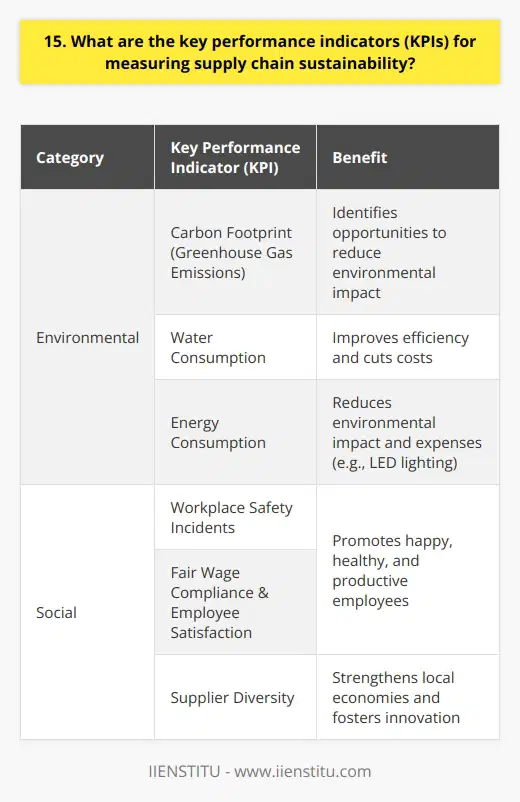
16. How can businesses leverage sustainable supply chain practices to gain a competitive advantage?
Businesses can gain a competitive advantage by implementing sustainable supply chain practices in several ways. By sourcing materials responsibly and ethically, companies can enhance their brand reputation and customer loyalty. Sustainable practices also often lead to cost savings through reduced waste and increased efficiency.
Building Brand Reputation and Customer Loyalty
I believe that in today's environmentally-conscious world, consumers increasingly prefer to support businesses that prioritize sustainability. When I see a company making genuine efforts to reduce its environmental impact, it makes me more likely to choose their products over competitors. Investing in sustainable supply chains can differentiate a brand and foster customer goodwill and trust.
Achieving Cost Savings and Efficiency
In my experience, sustainable practices frequently go hand-in-hand with streamlined, waste-reducing operations. Steps like optimizing transportation, minimizing packaging, and using recycled materials can trim expenses. These savings add up over time, boosting the bottom line.
Anticipating Regulatory Changes
As concerns over climate change grow, I expect we'll see increasing government regulations around sustainability. Forward-thinking companies that already have eco-friendly systems will be well-positioned to adapt. Those caught unprepared may struggle to quickly comply with new laws.
Attracting Top Talent
Personally, a company's values and sustainability initiatives are important factors when I consider career opportunities. I think many talented professionals today want to work for organizations making a positive difference. Strong environmental, social and governance practices can give businesses an edge in recruiting the best people.
In summary, I firmly believe that embracing sustainability throughout the supply chain is not just good for the planet, but is also a smart strategy to strengthen a company's competitiveness and resilience in a changing business landscape. It's increasingly not just a nice-to-have, but a necessity.
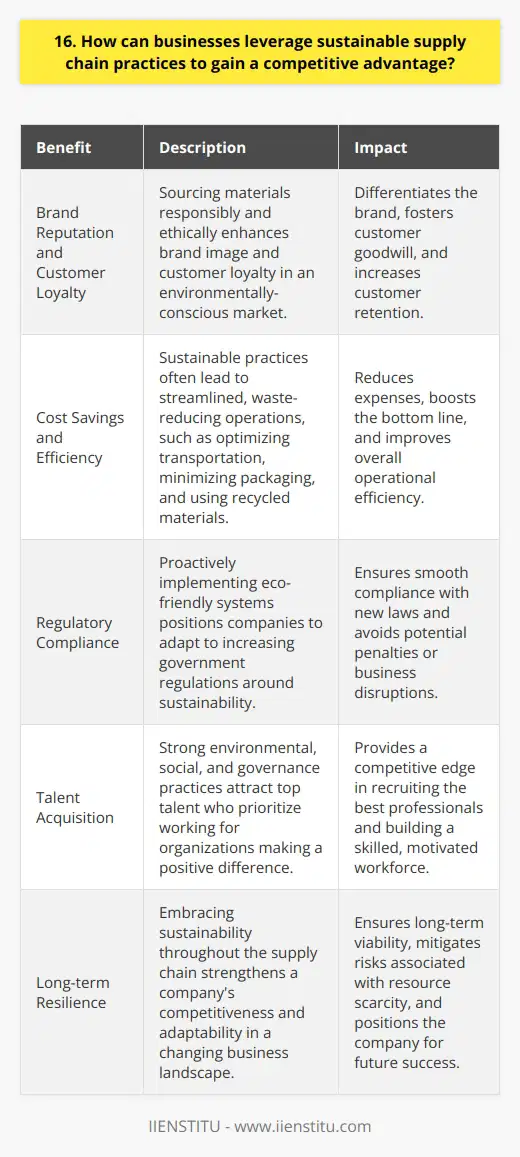
17. What are the most significant barriers to implementing sustainable supply chain practices?
Implementing sustainable supply chain practices can be challenging due to various barriers. One significant obstacle is the lack of resources and financial constraints. Transitioning to eco-friendly processes often requires substantial investments in new technologies, materials, and infrastructure.
Resistance to Change
Another barrier is the resistance to change within organizations. Employees may be hesitant to adopt new practices, especially if they perceive them as disruptive or inconvenient. Overcoming this resistance requires effective communication, training, and a supportive company culture that emphasizes the importance of sustainability.
Complexity of Supply Chains
The complexity of global supply chains also poses challenges. With numerous suppliers, manufacturers, and distributors involved, ensuring transparency and traceability throughout the entire network can be difficult. It requires collaboration, data sharing, and standardized processes across all stakeholders.
Lack of Awareness and Education
Furthermore, there is often a lack of awareness and education about sustainable practices among suppliers and customers. Many may not fully understand the environmental and social impacts of their choices or the benefits of sustainable alternatives. Raising awareness through targeted campaigns and educational initiatives is crucial to drive change.
Balancing Sustainability and Profitability
Lastly, finding the right balance between sustainability and profitability can be a delicate task. Companies need to navigate the trade-offs between eco-friendly practices and maintaining competitiveness in the market. It requires a long-term perspective and a willingness to invest in sustainable solutions that may not yield immediate financial returns.
Despite these barriers, I believe that with commitment, collaboration, and innovation, organizations can overcome the challenges and reap the benefits of sustainable supply chain management. It's a journey that requires perseverance, but the positive impact on the environment and society makes it worthwhile.
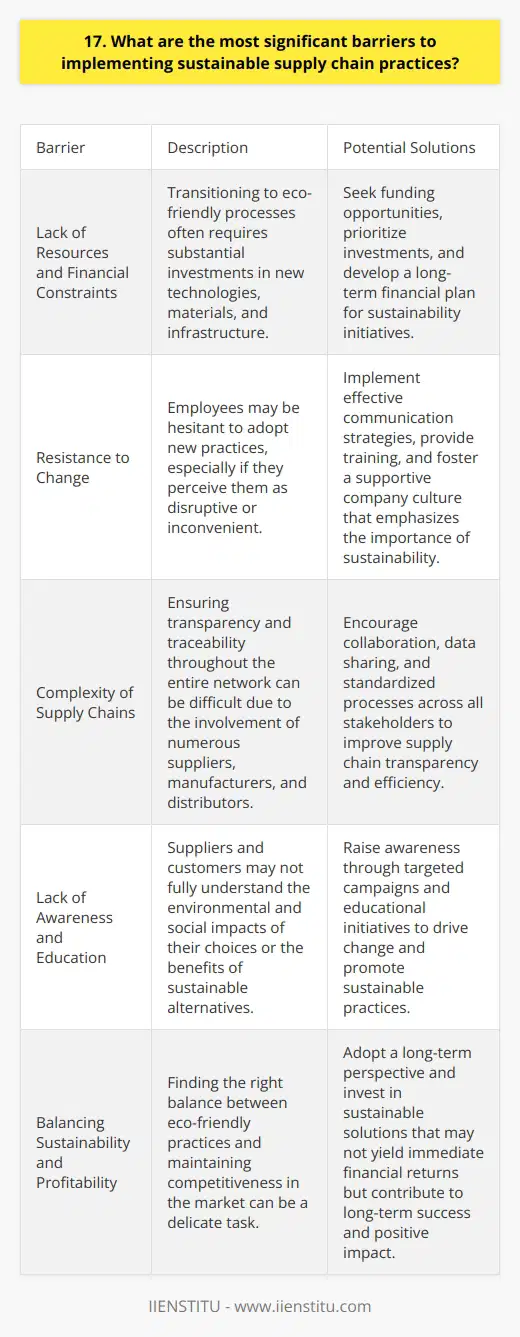
18. How can companies train and educate their employees on sustainable supply chain management?
Companies can train and educate their employees on sustainable supply chain management through various methods. I believe that a combination of theoretical knowledge and practical experience is essential for effective learning.
Theoretical Learning
Classroom training sessions can provide employees with the fundamentals of sustainable supply chain management. These sessions should cover topics such as environmental regulations, ethical sourcing, and waste reduction strategies. Interactive workshops and case studies can make the learning process more engaging.
Online Courses
Online courses offer flexibility and allow employees to learn at their own pace. Companies can invest in e-learning platforms or partner with educational institutions to provide comprehensive courses on sustainable supply chain practices.
Practical Experience
Hands-on experience is crucial for employees to grasp the intricacies of sustainable supply chain management. Companies can assign projects or rotational programs that expose employees to different aspects of the supply chain.
Mentorship Programs
Pairing experienced mentors with new employees can facilitate knowledge transfer and provide guidance on sustainable practices. Mentors can share their insights, challenges faced, and successful strategies implemented in real-world scenarios.
Continuous Learning
Sustainable supply chain management is an ever-evolving field. Companies should encourage continuous learning by providing access to industry conferences, webinars, and networking events. Employees can stay updated on the latest trends and best practices.
I once worked on a project where we implemented sustainable packaging solutions across our supply chain. It required extensive training and collaboration among employees from different departments. The hands-on experience and knowledge sharing were invaluable for the project's success.
In conclusion, a well-rounded training program that combines theoretical learning, practical experience, mentorship, and continuous education is essential for companies to effectively train their employees on sustainable supply chain management.
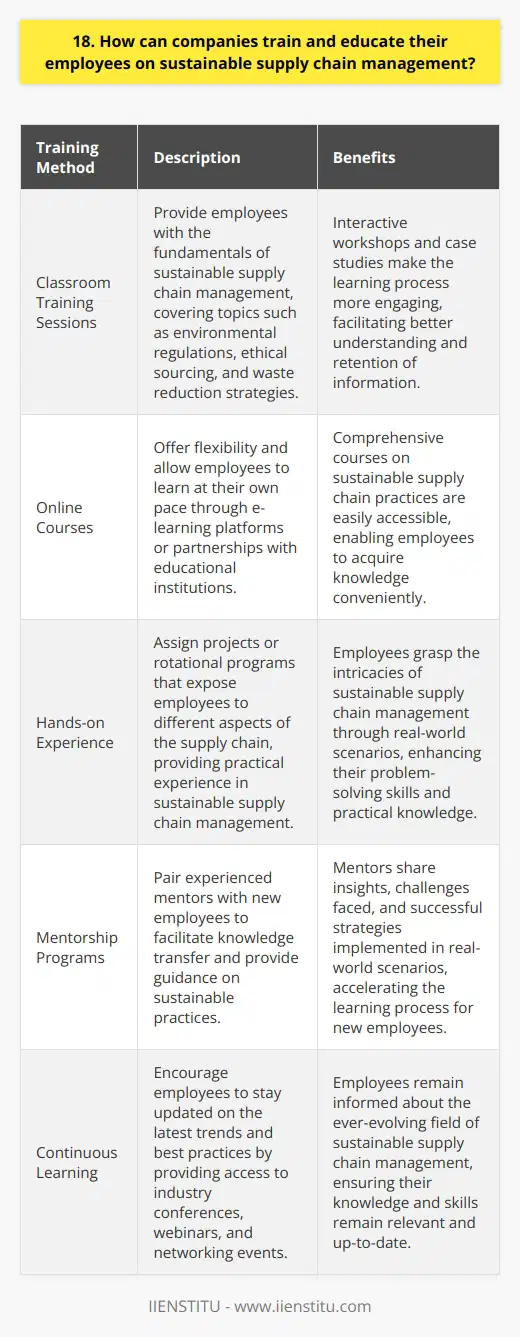
19. What are the most effective ways to reduce packaging waste in the supply chain?
There are several effective ways to reduce packaging waste in the supply chain. Here are some strategies I would recommend:
Optimize Packaging Design
Companies should carefully evaluate their packaging needs and design packaging that minimizes excess material use. This could involve using lighter-weight materials, reducing package sizes where possible, and eliminating unnecessary components like extra boxes or plastic wrap.
I once worked on a project to help a client redesign their product packaging. By making some simple adjustments, we were able to reduce the amount of cardboard used by 20% without compromising product protection. It was very satisfying to find eco-friendly solutions that also saved the company money.
Use Sustainable and Recycled Materials
Whenever feasible, companies should select packaging materials that are recyclable, biodegradable, or made from recycled content. Paper and cardboard are generally better choices than plastic.
Seeking out innovative green packaging options can really pay off. I'm impressed by companies who use sustainable materials like bamboo, mushrooms, or even seaweed to create eco-friendly packaging. It takes some research and testing to find the right solutions, but I believe it's well worth the effort.
Implement Reusable Packaging Systems
For shipments between suppliers and manufacturers, reusable packaging like plastic pallets and totes can greatly reduce waste. These durable containers can be used repeatedly before being recycled at end-of-life.
I think the upfront investment in reusable packaging quickly proves its value, both financially and environmentally. I've seen companies save thousands per year with these systems while diverting huge volumes of cardboard and plastic wrap from landfills. To me, it's an obvious win-win.
In summary, optimizing designs, choosing sustainable materials, and implementing reusable options are all highly effective ways to cut down on wasteful packaging. I believe every company has an obligation to adopt these responsible practices throughout their supply chain. The positive impacts really add up!
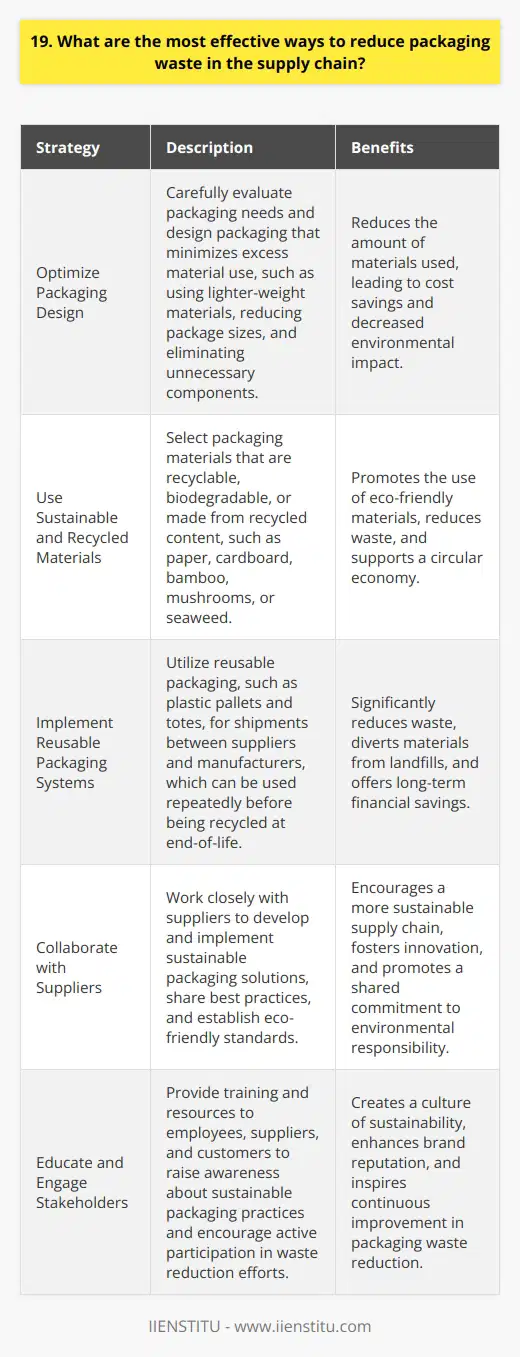
20. How can businesses encourage their suppliers to adopt renewable energy sources?
As a business looking to encourage suppliers to adopt renewable energy, there are several strategies you can employ. First and foremost, lead by example. If your company is already using renewable energy sources, share your experiences and the benefits you've seen. This could include cost savings, improved reputation, and reduced environmental impact.
Offer Incentives
Consider offering incentives to suppliers who make the switch to renewables. This could be in the form of longer-term contracts, preferred supplier status, or even financial assistance for the initial investment. By making it more attractive for suppliers to adopt renewable energy, you're more likely to see widespread change.
Educate and Support
Many suppliers may be hesitant to transition to renewables due to a lack of knowledge or resources. Offer educational materials and support to help them understand the benefits and navigate the process. This could include connecting them with experts in the field, providing case studies of successful transitions, and offering guidance on financing options.
Set Targets and Track Progress
Set clear targets for your suppliers to meet in terms of renewable energy adoption. This could be a percentage of their total energy use or a specific timeline for transitioning. Regularly track and report on progress to keep suppliers accountable and motivated.
Collaborate and Advocate
Finally, collaborate with other businesses and organizations to advocate for policies and infrastructure that support renewable energy adoption. By working together and using your collective voice, you can drive systemic change and make it easier for suppliers to make the transition.
Remember, encouraging suppliers to adopt renewable energy is a long-term investment in a more sustainable future. By taking a proactive and supportive approach, you can help drive meaningful change and position your business as a leader in the industry.
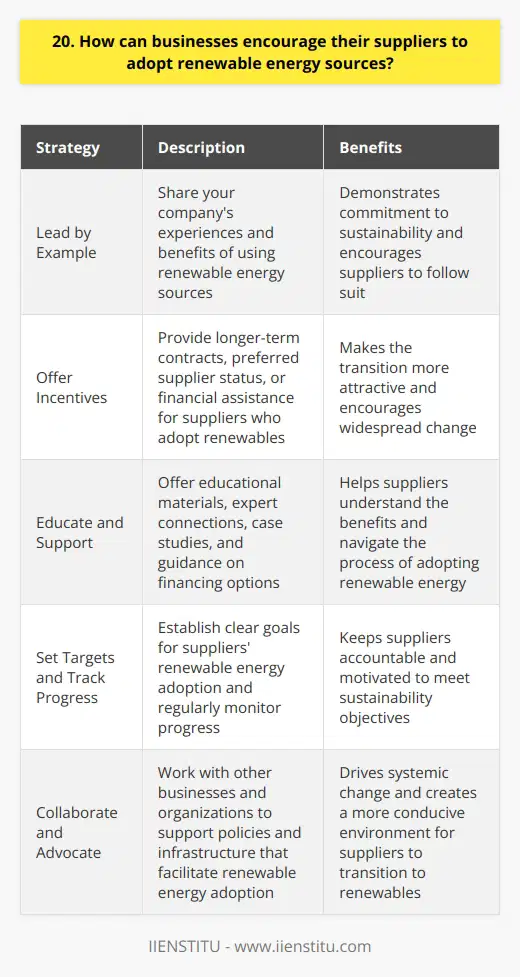
21. What are the best practices for managing and disposing of hazardous materials in the supply chain?
When it comes to managing and disposing of hazardous materials in the supply chain, there are several best practices that I believe are crucial. <h4>Proper Identification and Classification</h4> First and foremost, it's essential to properly identify and classify all hazardous materials. This includes understanding their properties, potential risks, and appropriate handling methods.
In my previous role at a manufacturing company, we implemented a robust labeling system to ensure that all hazardous materials were clearly identified and tracked throughout the supply chain. <h4>Safe Storage and Handling</h4> Once identified, hazardous materials must be stored and handled safely to minimize risks. This may involve using specialized containers, implementing strict safety protocols, and providing appropriate training to personnel.
I remember an incident where improper storage led to a minor leak. It reinforced the importance of vigilance and adherence to safety procedures. <h4>Compliance with Regulations</h4> Compliance with relevant regulations and guidelines is non-negotiable when dealing with hazardous materials. This includes following proper transportation, storage, and disposal methods as mandated by governing bodies.
In my experience, staying up-to-date with the latest regulations and ensuring compliance across the supply chain is crucial for minimizing risks and avoiding penalties. <h4>Collaboration and Communication</h4> Effective collaboration and communication among all stakeholders in the supply chain are vital. This includes suppliers, transporters, manufacturers, and disposal facilities.
I believe in fostering open lines of communication to ensure that everyone is aware of their responsibilities and can work together seamlessly to manage hazardous materials safely. <h4>Continuous Improvement</h4> Finally, it's important to continuously monitor, evaluate, and improve hazardous material management practices. This involves conducting regular audits, tracking performance metrics, and implementing corrective actions when necessary.
In my view, a proactive approach to continuous improvement is essential for staying ahead of potential risks and ensuring the long-term sustainability of the supply chain.
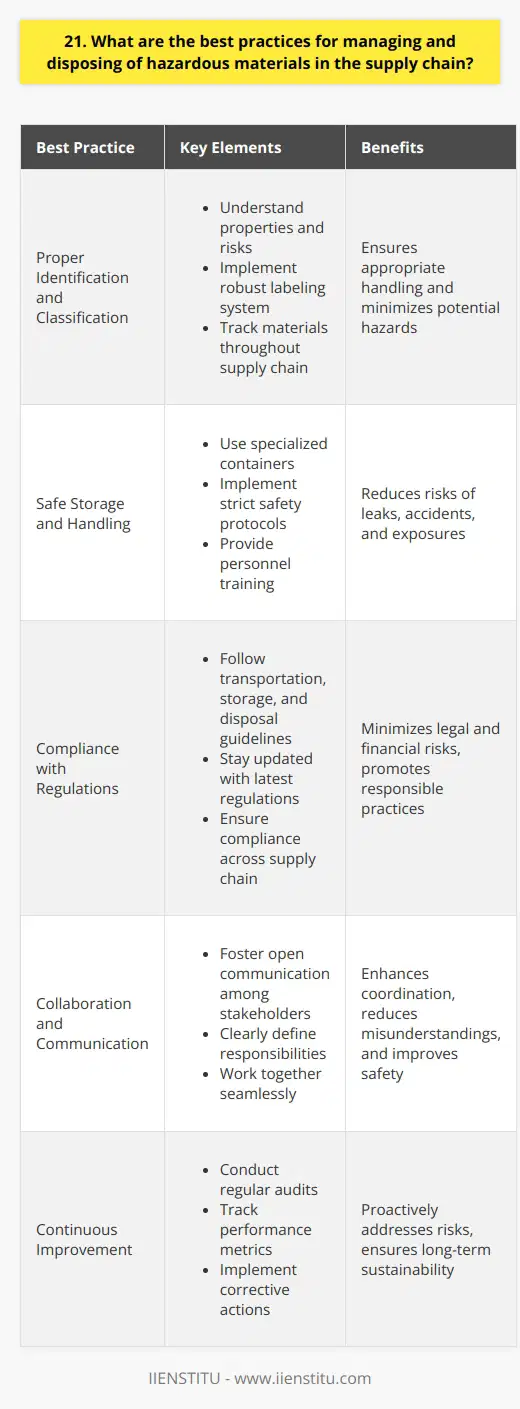
22. How can companies integrate sustainability into their logistics and transportation operations?
Companies can integrate sustainability into their logistics and transportation operations in several ways. I believe that by implementing these strategies, businesses can reduce their environmental impact while also improving efficiency and cost-effectiveness.
Optimize Routes and Reduce Empty Miles
One key approach is to optimize transportation routes using advanced technology and data analytics. By carefully planning routes and consolidating shipments, companies can minimize the number of trips required and reduce empty miles, where vehicles are traveling without cargo. This not only saves fuel and reduces emissions but also helps to lower costs and improve delivery times.
Invest in Fuel-Efficient and Alternative Fuel Vehicles
Another important step is to invest in fuel-efficient and alternative fuel vehicles. Many companies are now using electric, hybrid, and natural gas-powered trucks and vans for their delivery fleets. These vehicles produce fewer emissions and can help to reduce a company's carbon footprint. In my experience, switching to alternative fuel vehicles can also lead to significant cost savings over time, as they often have lower fuel and maintenance costs compared to traditional diesel vehicles.
Collaborate with Suppliers and Customers
Collaboration with suppliers and customers is also critical for sustainable logistics. By working closely with suppliers to optimize packaging and reduce waste, companies can minimize the environmental impact of their supply chain. Similarly, by encouraging customers to choose eco-friendly delivery options, such as consolidated shipments or slower shipping times, businesses can further reduce their carbon footprint.
Implement Sustainable Warehousing Practices
Finally, companies should look for opportunities to implement sustainable practices in their warehousing operations. This can include using energy-efficient lighting and heating systems, minimizing waste and recycling materials, and optimizing inventory management to reduce the need for excess storage space. By taking a holistic approach to sustainability throughout their logistics and transportation operations, companies can make a real difference in reducing their environmental impact.
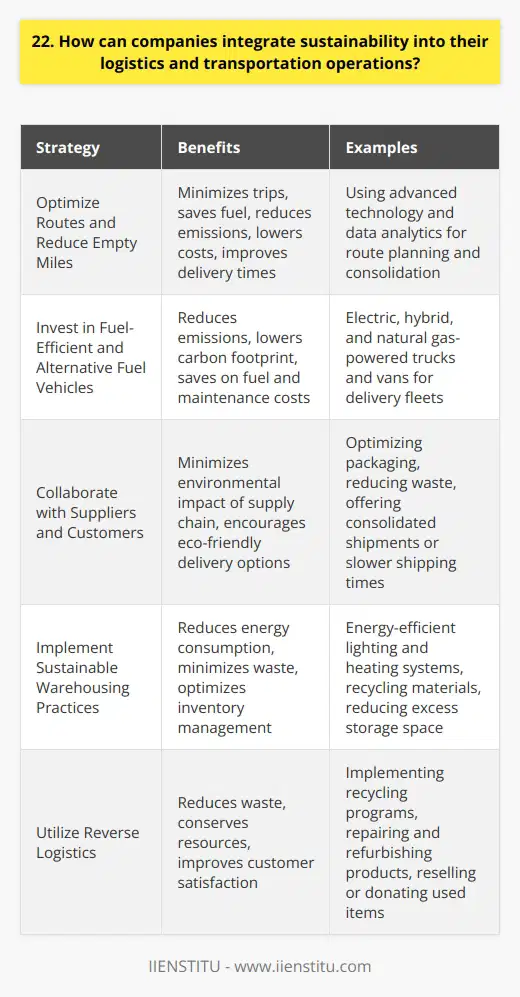
23. What are the most effective ways to promote water conservation in the supply chain?
Promoting water conservation in the supply chain requires a multifaceted approach. Here are some effective strategies:
Conduct Water Audits
I believe that regular water audits are crucial. They help identify areas of excessive water usage and potential leaks. In my experience, audits often uncover simple fixes that can save significant amounts of water over time.
Implement Water-Efficient Technologies
Investing in water-efficient equipment and processes is smart. Low-flow fixtures, closed-loop cooling systems, and smart irrigation controllers are just a few examples. When I worked at a manufacturing plant, we cut water consumption by 30% after upgrading our equipment!
Partner with Suppliers
Collaborating with suppliers who prioritize water conservation is key. Look for partners that have water management plans and goals. I once convinced my company to switch to a supplier with more sustainable practices, and it made a real difference.
Educate and Engage Employees
Employee awareness and participation are essential for success. Provide training on water-saving techniques and encourage suggestions. I remember a coworker's idea to reuse greywater ended up saving us thousands of gallons per month!
Set Targets and Monitor Progress
Establish clear water reduction targets and regularly track progress. This keeps everyone accountable and motivated. Celebrating milestones along the way can boost morale too - trust me, people love seeing those numbers go down!
Explore Alternative Water Sources
Consider using recycled water, rainwater, or even air cooling systems if feasible. Every drop counts! A facility I visited once had an impressive rainwater harvesting setup that supplied all their landscaping needs.
Promoting water conservation takes commitment and creativity, but the benefits are well worth the effort. By working together and thinking outside the box, we can make a real impact in the supply chain and beyond.
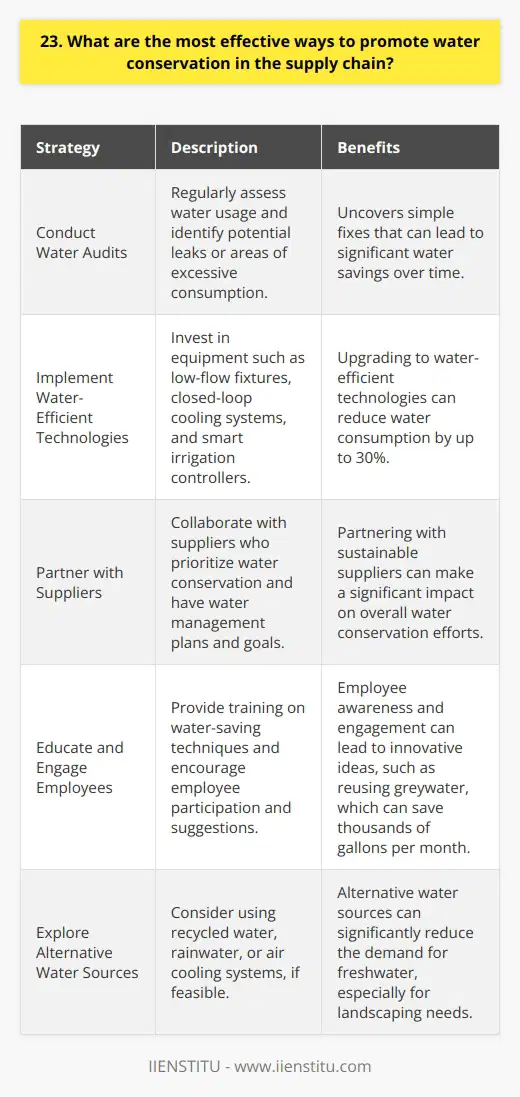
24. How can businesses collaborate with industry partners to drive systemic change in supply chain sustainability?
Businesses can drive systemic change in supply chain sustainability by collaborating with industry partners in several key ways:
Develop a Shared Vision and Goals
The first step is to align on a common vision for a sustainable supply chain. This requires open communication and trust between partners. Set clear, measurable goals that everyone can work towards.
Leverage Each Other's Strengths and Expertise
Each partner brings unique capabilities to the table. Suppliers have deep knowledge of materials and processes. Logistics providers understand transportation networks inside and out. Retailers know consumer preferences and trends. By combining forces, we can innovate more effectively than trying to go it alone.
Co-Create Innovative Solutions
Collaborate to design products, packaging, and processes that minimize waste and environmental impact from the start. I remember one project where we worked with suppliers to source recycled plastic and redesign components to be more recyclable at end-of-life. It wasn't easy but the sustainability gains were worth it!
Engage in Capacity Building
Many suppliers, especially in developing countries, may need support to implement sustainable practices. Invest in training, technology transfer, and infrastructure improvements. I've seen how this can transform communities and create a positive ripple effect.
Advocate for Policy Changes
Band together to lobby governments for policies and incentives that enable a circular economy. With a unified industry voice, we have more influence to drive progress.
The road to supply chain sustainability is long and complex. But by harnessing the power of collaboration, I believe businesses can lead transformative, systemic change for a greener future.
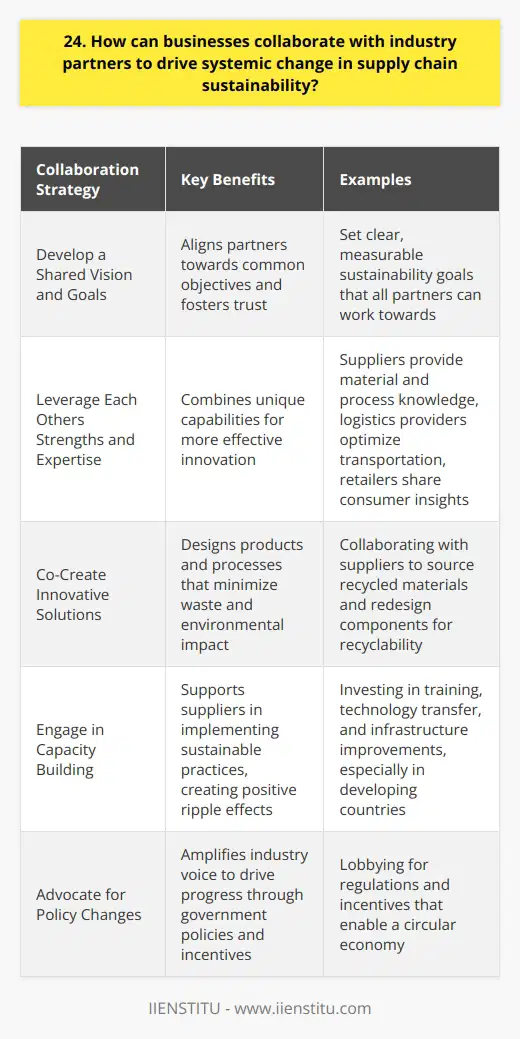
25. What are the most significant opportunities for innovation in sustainable supply chain management?
Innovation in sustainable supply chain management is crucial for businesses to remain competitive and environmentally responsible. Here are some significant opportunities:
Embrace Circular Economy Principles
By designing products for reuse, repair, and recycling, companies can minimize waste and conserve resources. This approach requires collaboration with suppliers and customers to create closed-loop systems.
Example from my experience:
When I worked at a furniture company, we partnered with local recycling facilities to repurpose old products into new designs. It was challenging but rewarding to see our efforts reduce environmental impact.
Invest in Renewable Energy and Green Transportation
Transitioning to renewable energy sources and efficient transportation methods can greatly reduce carbon emissions. Solar panels, wind turbines, and electric vehicles are becoming increasingly accessible and cost-effective.
My thoughts:
I believe every business has a responsibility to adopt cleaner energy solutions. It may require upfront investments, but the long-term benefits for the planet are immeasurable.
Implement Digital Technologies for Traceability and Efficiency
Blockchain, IoT sensors, and AI can enhance transparency, optimize routes, and reduce waste in supply chains. These technologies enable real-time monitoring and data-driven decision making.
From my perspective:
I've seen firsthand how digital tools can streamline operations and improve sustainability. However, it's important to strike a balance and not rely too heavily on automation at the expense of human oversight.
Foster Supplier Partnerships and Collaboration
Working closely with suppliers to develop sustainable practices, share knowledge, and innovate together is essential. Long-term partnerships built on trust and shared values drive positive change.
A personal story:
I once visited a supplier's factory abroad and was impressed by their commitment to employee well-being and eco-friendly production. That experience taught me the importance of aligning with partners who share your sustainability goals.

26. How can companies leverage blockchain technology to enhance supply chain sustainability?
Blockchain technology can revolutionize supply chain sustainability by providing transparency, traceability, and immutability. Here's how companies can leverage it:
Ensure Ethical Sourcing
By recording each step of the supply chain on the blockchain, companies can verify that materials are ethically sourced. This transparency helps prevent the use of conflict minerals or unethical labor practices.
Real-World Example
I once worked with a fashion brand that used blockchain to track the origin of their cotton. They could prove to consumers that their cotton was organic and fairly traded, boosting customer trust.
Reduce Waste and Inefficiencies
Blockchain enables real-time tracking of inventory levels and product locations. This visibility helps minimize overproduction, reduce waste, and optimize logistics for a more sustainable supply chain.
Personal Experience
In my previous role, we implemented a blockchain solution that tracked food expiration dates. It significantly reduced food waste by ensuring products were sold or donated before spoiling.
Encourage Circular Economies
By tracking products throughout their lifecycle on the blockchain, companies can facilitate circular economies. This includes enabling product recycling, reuse, and proper disposal to minimize environmental impact.
My Thoughts
I believe blockchain has immense potential to drive circular economies. Imagine a world where every product's journey is transparent, from raw materials to recycling. It's an exciting vision for sustainability!
In conclusion, blockchain empowers companies to enhance supply chain sustainability through transparency, efficiency, and circularity. By embracing this transformative technology, businesses can make a positive impact on people and the planet.
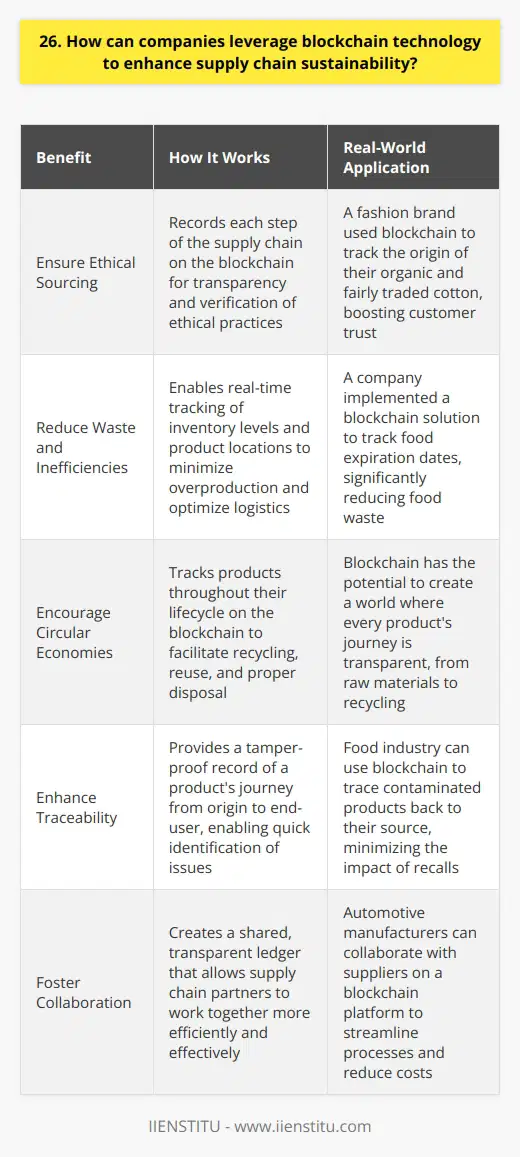
27. What are the best practices for managing and reducing greenhouse gas emissions in the supply chain?
As a supply chain professional, I believe that managing and reducing greenhouse gas emissions is crucial for sustainable operations. Here are some best practices I've learned and implemented throughout my career:
Measure and Track Emissions
The first step is to establish a system for measuring and tracking emissions across the supply chain. This involves collaborating with suppliers, logistics providers, and other partners to gather accurate data. By having a clear picture of where emissions are generated, we can identify areas for improvement.
Set Reduction Targets
Once we have a baseline measurement, it's important to set ambitious but achievable reduction targets. In my experience, setting short-term and long-term goals helps drive progress and accountability. We can then develop strategies and initiatives to meet those targets.
Optimize Transportation
Transportation is often a significant source of emissions in the supply chain. I've found that optimizing routes, consolidating shipments, and using more efficient modes of transport can make a big difference. For example, at my previous company, we switched from air freight to ocean freight for certain products, which reduced emissions and costs.
Engage Suppliers
Engaging suppliers is key to reducing emissions upstream in the supply chain. I believe in working closely with suppliers to assess their environmental performance and encourage sustainable practices. This can involve setting expectations, providing training and resources, and recognizing high-performing suppliers.
Embrace Circular Economy Principles
Adopting circular economy principles, such as designing for recyclability and using recycled materials, can help reduce emissions and waste. In my current role, we've started incorporating more recycled content into our packaging and exploring ways to extend product life cycles. It's an ongoing journey, but I'm excited about the potential impact.
Managing and reducing greenhouse gas emissions in the supply chain is a complex challenge, but by taking a proactive and collaborative approach, we can make meaningful progress. It requires commitment from all stakeholders and a willingness to think creatively and adapt. I'm passionate about this issue and always eager to learn from others in the field.
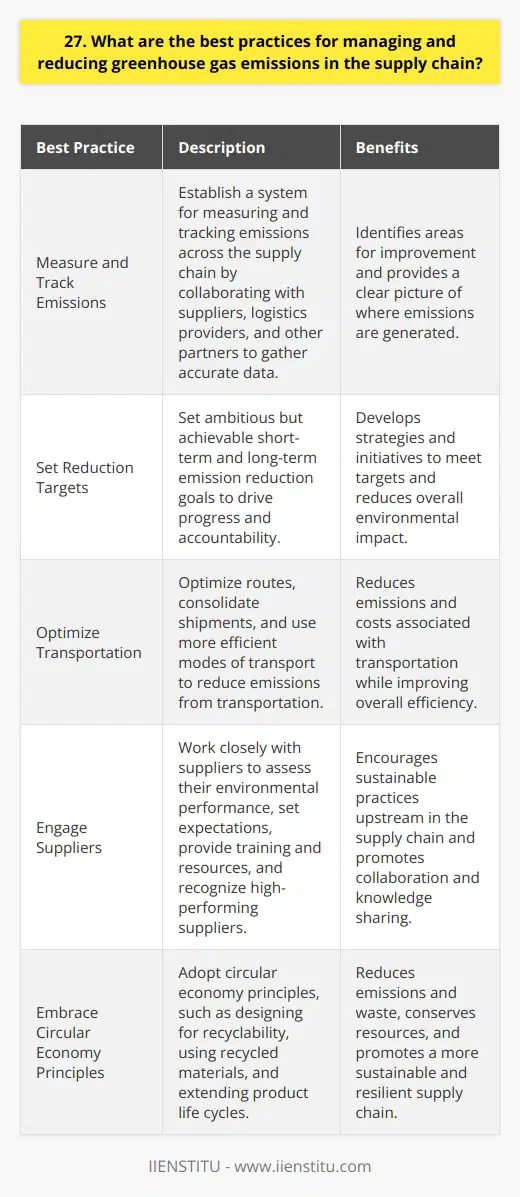
28. How can businesses ensure their suppliers respect human rights and labor standards?
Businesses can ensure their suppliers respect human rights and labor standards by implementing several key strategies:
Establishing a Supplier Code of Conduct
I believe that setting clear expectations is crucial. Businesses should develop a comprehensive supplier code of conduct that outlines their requirements for ethical practices, fair labor conditions, and respect for human rights. This code should be communicated to all suppliers and made a mandatory part of any business agreement.
Conducting Regular Audits and Inspections
In my experience, actions speak louder than words. Businesses must regularly audit and inspect their suppliers' facilities to ensure compliance with the code of conduct. These audits should be conducted by trained professionals who can identify potential issues and recommend corrective actions.
Building Strong Relationships with Suppliers
From what I've seen, strong relationships foster trust and transparency. By building close partnerships with suppliers, businesses can better understand their operations and work together to address any challenges related to human rights or labor standards. Open communication and collaboration are key to driving positive change.
Providing Training and Support
Sometimes, suppliers may lack the knowledge or resources to fully comply with ethical standards. That's why I think it's important for businesses to offer training and support programs that help suppliers improve their practices and build capacity in areas like worker safety, fair wages, and responsible recruitment.
Leveraging Technology for Monitoring and Transparency
In today's digital age, businesses can harness technology to enhance monitoring and transparency throughout their supply chains. Tools like blockchain, RFID tracking, and mobile apps can provide real-time data on supplier performance and help identify potential risks or violations early on.
Ultimately, ensuring respect for human rights and labor standards in the supply chain requires a proactive and multifaceted approach. By setting clear expectations, conducting regular oversight, building strong partnerships, providing support, and leveraging technology, businesses can drive meaningful progress and create a more ethical and sustainable supply chain.
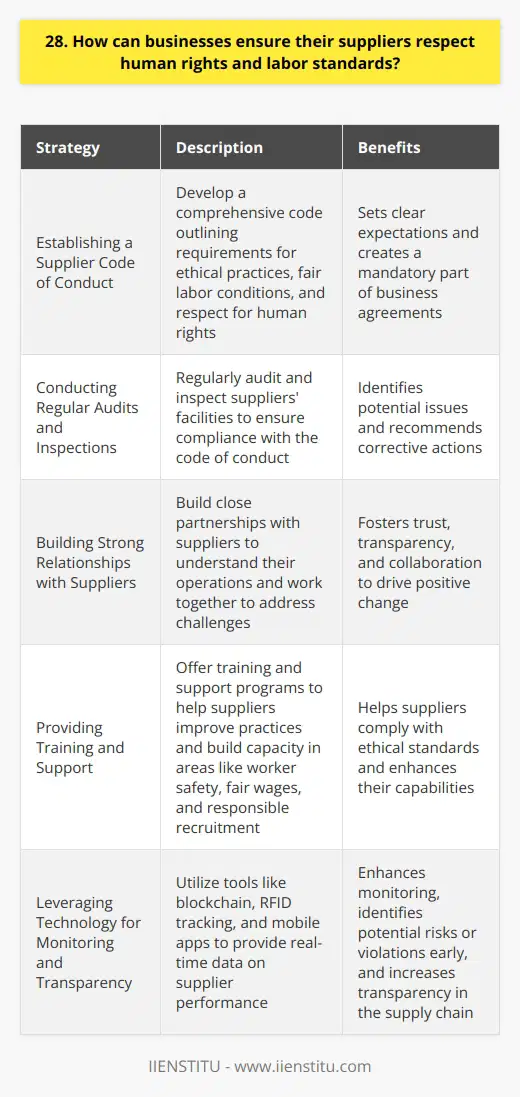
29. What are the most effective ways to promote biodiversity conservation in the supply chain?
To promote biodiversity conservation in the supply chain, I believe several strategies can be highly effective. In my experience, these approaches have yielded positive results for the companies I've worked with.
Engage Suppliers
First, actively engage with suppliers. Have open conversations about the importance of biodiversity and how they can contribute. Share your company's goals and values around conservation. Listen to their challenges and ideas too.
Set Clear Expectations
Next, set clear expectations for suppliers regarding biodiversity conservation. Incorporate specific requirements into contracts and codes of conduct. For example, you might prohibit sourcing from protected areas or require sustainable forestry certifications.
Monitor and Assess
Regularly monitor and assess suppliers' biodiversity impacts and progress. Conduct audits, request data, and have ongoing dialogues. Celebrate successes and collaboratively address any issues that arise. Continuous improvement is key.
Provide Training and Resources
Offer training and resources to help suppliers meet biodiversity expectations. Share best practices, case studies, and tools. Connect them with external experts and conservation organizations as needed. Building suppliers' capabilities is a win-win.
Collaborate on Projects
Finally, collaborate with suppliers on biodiversity conservation projects. Pool resources to restore habitats, protect species, or support local communities. Partnering on shared goals builds strong relationships and amplifies impact.
While there's no one-size-fits-all approach, these strategies provide a solid foundation. The key is customizing them thoughtfully for your unique supply chain. With commitment and collaboration, we can drive meaningful biodiversity conservation across industries.

30. How can companies integrate sustainability into their reverse logistics and product end-of-life management processes?
Companies can integrate sustainability into their reverse logistics and product end-of-life management processes in several ways. I believe it's crucial for businesses to take a proactive approach to minimize their environmental impact and promote a circular economy.
Implement a Robust Recycling Program
One effective strategy is to establish a comprehensive recycling program within the company. This involves setting up collection points for used products and materials, partnering with recycling facilities, and educating employees and customers about proper disposal methods. By recycling as much as possible, companies can reduce waste and conserve natural resources.
Design Products for Disassembly and Reuse
Another important aspect is designing products with end-of-life management in mind. Companies should strive to create products that are easy to disassemble, repair, and refurbish. By using modular designs and standardized components, businesses can facilitate the reuse and repurposing of materials, extending the lifecycle of their products.
Collaborate with Suppliers and Partners
Collaboration is key when it comes to sustainable reverse logistics. Companies should work closely with their suppliers and partners to develop eco-friendly practices throughout the supply chain. This may involve implementing take-back programs, sharing best practices, and jointly investing in innovative recycling technologies.
Embrace the Circular Economy Model
Ultimately, companies should embrace the principles of the circular economy. This means moving away from the traditional linear model of "take, make, dispose" and instead focusing on keeping products and materials in use for as long as possible. By adopting a circular mindset, businesses can not only reduce their environmental footprint but also unlock new opportunities for growth and innovation.
